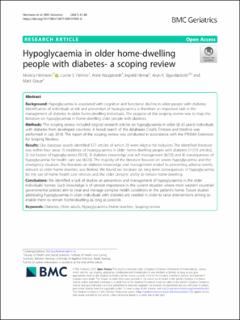| dc.contributor.author | Hermann, Monica | |
| dc.contributor.author | Heimro, Lovise Sæbø | |
| dc.contributor.author | Haugstvedt, Anne | |
| dc.contributor.author | Hernar, Ingvild | |
| dc.contributor.author | Sigurdardottir, Árún K. | |
| dc.contributor.author | Graue, Marit | |
| dc.date.accessioned | 2023-05-09T10:50:39Z | |
| dc.date.available | 2023-05-09T10:50:39Z | |
| dc.date.created | 2021-05-12T17:31:23Z | |
| dc.date.issued | 2021 | |
| dc.identifier.citation | BMC Geriatrics. 2021, 21 (1), 1-11. | en_US |
| dc.identifier.issn | 1471-2318 | |
| dc.identifier.uri | https://hdl.handle.net/11250/3067255 | |
| dc.description.abstract | Background
Hypoglycaemia is associated with cognitive and functional decline in older people with diabetes. Identification of individuals at risk and prevention of hypoglycaemia is therefore an important task in the management of diabetes in older home-dwelling individuals. The purpose of this scoping review was to map the literature on hypoglycaemia in home-dwelling older people with diabetes.
Methods
This scoping review included original research articles on hypoglycaemia in older (≥ 65 years) individuals with diabetes from developed countries. A broad search of the databases Cinahl, Embase and Medline was performed in July 2018. The report of the scoping review was conducted in accordance with the PRISMA Extension for Scoping Reviews.
Results
Our database search identified 577 articles of which 23 were eligible for inclusion. The identified literature was within four areas: 1) incidence of hypoglycaemia in older home-dwelling people with diabetes (11/23 articles), 2) risk factors of hypoglycaemia (9/23), 3) diabetes knowledge and self-management (6/23) and 4) consequences of hypoglycaemia for health care use (6/23). The majority of the literature focused on severe hypoglycaemia and the emergency situation. The literature on diabetes knowledge and management related to preventing adverse events relevant to older home-dwellers, was limited. We found no literature on long-term consequences of hypoglycaemia for the use of home health care services and the older persons’ ability to remain home-dwelling.
Conclusions
We identified a lack of studies on prevention and management of hypoglycaemia in the older individuals’ homes. Such knowledge is of utmost importance in the current situation where most western countries’ governmental policies aim to treat and manage complex health conditions in the patient’s home. Future studies addressing hypoglycaemia in older individuals with diabetes are needed in order to tailor interventions aiming to enable them to remain home-dwelling as long as possible. | en_US |
| dc.language.iso | eng | en_US |
| dc.publisher | BioMed Central | en_US |
| dc.rights | Navngivelse 4.0 Internasjonal | * |
| dc.rights.uri | http://creativecommons.org/licenses/by/4.0/deed.no | * |
| dc.title | Hypoglycaemia in older home-dwelling people with diabetes- a scoping review | en_US |
| dc.type | Peer reviewed | en_US |
| dc.type | Journal article | en_US |
| dc.description.version | publishedVersion | en_US |
| dc.rights.holder | © The Author(s). 2021 | en_US |
| dc.source.pagenumber | 1-11 | en_US |
| dc.source.volume | 21 | en_US |
| dc.source.journal | BMC Geriatrics | en_US |
| dc.source.issue | 1 | en_US |
| dc.identifier.doi | 10.1186/s12877-020-01961-6 | |
| dc.identifier.cristin | 1909798 | |
| dc.source.articlenumber | 20 | en_US |
| cristin.ispublished | true | |
| cristin.fulltext | original | |
| cristin.qualitycode | 1 | |

